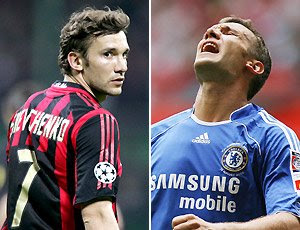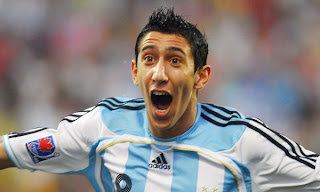
A THING OF THE PAST?
Has Mikael Silvestre's transfer from Manchester United to Arsenal signaled the end of this iconic feud? Alan Dawson looks back at the most dramatic moments of fierce rivalry bet...
The sight of a sophisticated Frenchman and a moxie Scot living in publicised inharmony had long been a leit motif in Premier League history.
Sir Alex Ferguson had built up such a successful team throughout the 1990s that he began to monopolise English competition. Arsene Wenger's appointment as the orchestrator of affairs at Arsenal in 1996 acted as a catalyst for a clash of personalities, cultures, and footballing creeds as the little-known former Grampus-Eight manager appeared to threaten the status quo of Manc dominance and superiority. The press loved it, the fans looked forward to it and the meetings between the two sides was constantly billed as compulsory viewing as folk from all over our green and blue ball tuned in to witness.
The fixtures contained everything: from spilt soup and pitched pizza; to boot-bombardment and cut eyebrows; to a magnitude of carding, harming, penalty-calls and brawls, as the head coaches started seething by the touchlines with at least one of them weeping pride.
My how times have changed. Despite coveting certain players within the other managers' squad, neither would cement their interest with a weighty financial bid. Ever. It was unheard of. But on August 20 here we are, contemplating how Mikael Silvestre - who spent nine trophy-laden years at Old Trafford - will fit into the Emirates regime.
How did two teams, and specifically two managers, decide to do business after a dozen bitter years of heated and well-documented animosity? What changed?
Genesis
Before Sir Alex could even offer Arsene a private post-match glass of red, he publicly whined: "He comes over here from Japan and tries to tell us how to run English football." Welcome to England Arsene, do enjoy your bonny sojourn.
Relations continued to sour in 1998 as the new Arsenal boss and his north London side were crowned Premier League victors for the first time in its new format - Manchester United claiming the trophy for four of the previous five seasons. Marc Overmars not only netted a crucial goal against the M16 team on their march to the league, but also scored the first of two in that year's FA Cup final against Newcastle. The Gunners sealed a glorious double at the expense of United.
And so began years of title tug-of-wars between London and Manchester that would increase in scurrilousness with every passing season. Each side's venom for the other ironically boiled down to the same vented belief: a disgust at the other side's disrespectful arrogance.
Exodus: Fergie's Flying Boot (February 2003)
The sixth round of the FA Cup in 2003 pitted the two adversaries against each other at Old Trafford. Three yellow cards within the opening seven minutes were issued indicating a tumultuous tie had rightly been anticipated. Jeff Winter, officiator for the emotive afternoon even appealed to captains Roy Keane and Patrick Vieira for peace. Arsenal emerged triumphant due to an Edu free-kick that took a deflection off David Beckham, and a neatly slotted side-foot courtesy of then record-signing Sylvain Wiltord.
Despite the highly charged nature of the match, it was really the calm before the storm, as a controversial melee kicked off in the home side's dressing room that David Beckham would later pay testament to in his autobiography My Side.
Beckham was deemed to be at fault for the first of Arsenal's goals. "I was getting bullied in public, and was backed into a corner for no reason other than spite," he said. Sir Alex was issuing his infamous hairdryer treatment to the team, but Becks was bearing the brunt of it. The fiery Scot then lashed at a football boot that socked the Golden Boy's brow. Gary Neville, Ryan Giggs, and Ruud van Nistelrooy then had to hold Beckham back as he 'went for the gaffer'. The midfielder emerged the next day in front of the paparrazi with his hair tightly pulled back showing off his cut to the world and his wife.
Ferguson later apologised, but Beckham was still sold that summer.
Battle Of Old Trafford (October 2004)
Pizzagate. The nadir of their competitive rivalry unraveled in front of an estimated 500,000,000 people. Arsenal had gone the previous season unbeaten and were on a 49-game run without loss. The equivalent fixture the season before (September 2003) saw Van Nistelrooy miss a last minute penalty, who was then duly molested by an over-excited Martin Keown and a Motley Crue of furious Gunners. The whole match was marred by petty gamesmanship, with Vieira getting sent off for a kick at Ruud. Four Arsenal players were banned as a result of their altercation with van Nistelrooy and had to pay a collective fine of £275,000. Two Red Devils were also fined for improper conduct.
The Battle of the Buffet, as it had been dubbed with hindsight, was to be no different.
Claims of unsporting conduct, vicious fouls, cheating, penalty calls, and poor refereeing were made throughout the 90 minutes and beyond. Manchester United defeated the 'Invincibles' by two goals to nil. But it is the post-match antics that are of more interest as a gastronomic riot erupted in the tunnel.
In My Defence, Ashley Cole's autobiography released after the 2006 World Cup, he revealed: "This slice of pizza came flying over my head and hit Fergie straight in the mush. All mouths gawped to see pizza slip off this famous face and roll down his nice black suit."
It didn't end there. Coffee was hurled, pea and/or tomato soup was lobbed, and Paul Johnson - Arsenal's equipment manager - was seen to have claret dripping from his nose.
Arsene Wenger accused the referee, this time Mike Riley, of Manc favouritism and labelled Man U's poaching striker (RvN) a 'cheat'.
Tension was so tight that when the return leg was due at Highbury in February 2005, Metropolitan Police urged the warring managers to end their dispute for fear their personal battle would translate to opposition fans.
Revelation: Chelsea - The Rise Of The Common Enemy
The rise of London's next force - an Abramovich enriched Chelsea side - saw both Arsene Wenger and Sir Alex Ferguson unite in wanting to slay a common enemy. The arrogance of a newly-installed cocky Champions League-winning manager in Jose Mourinho, together with top-class signings such as Michael Essien and Shaun Wright Phillips in 2005, and then Michael Ballack, Ashley Cole, Salomon Kalou, and John Obi Mikel in 2006, were seen as a threat that would destabalise United's and Arsenal's ability to conquer.
The signing of John Obi Mikel to Chelsea diverted Sir Alex's attention away from Arsene, and toward Jose. In 2005 Manchester United offered Norweigan club Lyn Oslo £4million in order to buy their Nigerian midfielder, Mikel. The deal was struck, it was announced on the Red Devil's website, and Mikel even appeared in a press conference with red shirt in tow, expressing his delight.
However, around the same time, Chelsea countered United's claims that Mikel was theirs, and stated the player had even trained in front of Jose Mourinho. After a long-drawn out saga Chelsea paid £4million to Lyn Oslo, and £12million to United. Ferguson lost out on a prime target.
Mikel aside though, Ferguson and Mourinho always seemed to have a mutual respect for each other. The same could not be said of Mourinho and Wenger. The Chelsea manager accused Arsene of being a 'voyeur', claiming the Frenchman to be obsessed with his ranks. Wenger on the other hand regarded Mourinho as a man 'disconnected with reality'.
The emergence of Chelsea as a Premier League contender diluted the hostility between Ferguson and Wenger.
Post-Match Grace
In recent times Sir Alex and Arsene have viewed the other with greater venerability, and this was evident at the end of Manchester United's defeat of Arsenal at the back of last season. Arsenal drew first blood, but United clawed their way back due to a Cristiano Ronaldo spot kick, and an Owen Hargreaves free kick.
At the end of the game, in seasons gone by, one would have expected twelve rounds, but there wasn't even a bell. After the final whistle Sir Alex consoled his old adversary and, with an arm round his shoulder, Wenger humbly accepted defeated: both respectful of the other's achievements and footballing ideology.
Mikael Silvestre
Mr. Wenger has a habit of surprising his supporters. His latest acquistion will come as the greatest shock though as the last footballer to have been traded from Manchester United to Arsenal was Brian Kidd in 1974, and this is the only transfer to have ever been struck involving Wenger and Ferguson.
On his arrival, Silvestre told Arsenal's official website: "I’ve spent nine years at United and I’ll remember that time fondly but I’m ready for a new challenge. Arsenal is known for playing technical and skilful football, and has a young but experienced squad. I’m really excited about this next stage of my career, hopefully playing my part in helping the Club to new successes."
Sir Alex paid tribute to his former player, but chose not to mention the club where he will now be plying his trade. "Mikael was a great servant and a wonderful professional. We wish him all the best at his new club and thank him for his service."
Where does this leave Arsene and Alex, then? Will we never again find them feuding on the touchline? Will the competitive rivalry the two clubs have built up continue to gain sustenance in the absence of violent on-and-off pitch quibbles? Will the most important fixture in the calender be earmarked for their respective local derbies, or for one of their biggest threats?
Old Testaments
Sir Alex Ferguson: "He [Arsene Wenger] is a disgrace."
Arsene Wenger: "I will never again answer any questions about this man."
Sir Alex Ferguson: "He ran at me with his hands raised saying 'what do you want to do about it?'"
Arsene Wenger: "What would I do if Alex wasn't around? I would have no one to keep me on my toes or to fight. Of course I am pleased that he changed his mind [about retirement]. I enjoy our rivalry. It is good for Arsenal, good for Manchester United and good for both of us"





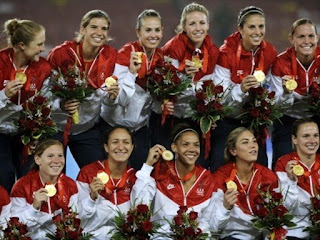
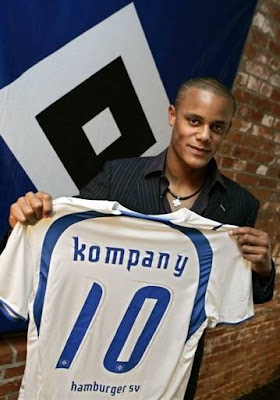

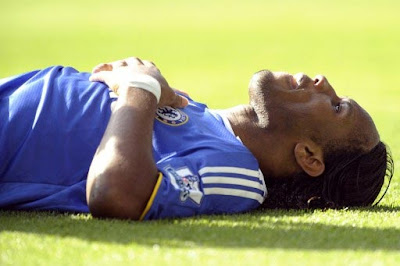











.jpg)




